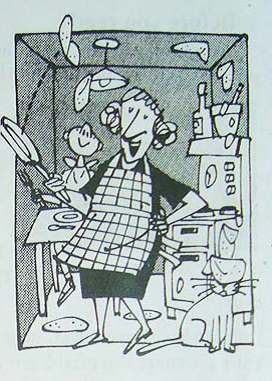ملخص الدرس / الرابعة متوسط/اللغة الإنجليزية/File 1/The imperative
Exemple

Read the text below :
" Tomorrow is Pancake Day. You will make pancakes, won't you? This is my recipe.
It's very easy. You'll need 200 grams of flour, 4 eggs, 500ml of milk, some water, 80 grams of butter, some sugar, some salt and a little cooking oil. Now, to make the pancakes. First mix the sifted flour and the eggs with a fork, and slowly mix in the milk and the oil. Then, put a little oil in the pan. Next heat the pan. It must be very hot. after that, pour in two tablespoonfuls of the mixture and cook for 45 seconds. Finally, toss the pancake once and cook for another 45 seconds. Serve with a little
sugar and some lemon juice"
the rule
Next is a time sequencer. It is used to indicate the order in which the various steps of a procedure are carried out.
Heat is a verb in the imperative.
The imperative is used for making requests, giving instructions, directions, warnings, orders/commands and advice
Forms:
|
Affirmative
|
Question |
Negative |
| I work | do I work? |
I do not work |
| you work | do you work? |
you do not work |
| he/she/it works | does he/she/it work? |
he/she/it does not work |
| we work | do we work? |
we do not work |
| Ithey work | do they work? |
they do not work |
Verbs ending in s. Z-X, .ch, and -sh have -es in the third person singular (for example misses, buzzes, fixes, watches, pushes) Other verbs have -s. Exceptions: goes, does. Verbs ending in consonant + y have -ies in the third person singular (for example hurries, worries). "General time'
"General time :
We can use the simple present to talk about actions and situations in
general time' - things which happen at any time, or repeatedly, or all the time
I go to London about three times a week.
My parents live near Dover.
Watelive freezego s at 0 Centigrade.
go ; live; freezego → Now
Momentary' actions:
We can also use the simple present to talk about 'momentary' present actions things which take a very short time to happen.
This tense is often used in sports commentaries.
Lydiard passes to Taylor, Taylor to Morrison, Morrison back to Taylor ... and Taylor shoots - and it's a goal!!!
Actions around now' (present progressive) We do not usually use the simple present to talk about longer actions and situations which are going on around now. In this case, we prefer the present progressive. (See 262.)
'What are you doing?' I'm reading. (NOT... I read.)
There are a few exceptions: verbs which are not used in progressive forms (see 225).
I like this wine. (NOT I'm Hiking this wine)